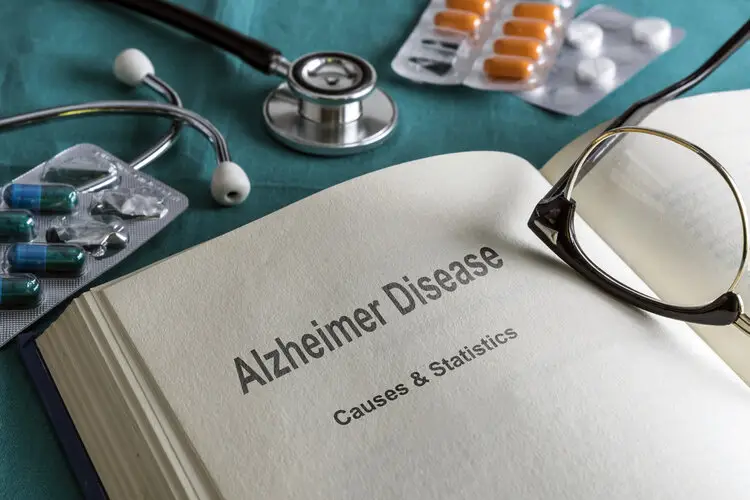Ⅰ. Scientists: AB blood type may be more susceptible to Alzheimer’s disease
The authoritative journal "JAMA Neurology" once published a study. By comparing the probability of thinking and memory problems in people with different blood types, it was found that people with AB blood type have an 82% higher risk than other blood types. Therefore, it is speculated that people with this blood type are more likely to develop Alzheimer’s disease in their later years.
The researcher speculated that the cause of this consequence may be factor 8. The main function of this factor 8 is to help blood coagulation. Therefore, the higher its concentration, the higher the degree of blood coagulation, which means that blood circulation is more likely to be affected, causing the brain to be more susceptible to ischemia and hypoxia, increasing the risk of dementia in the future.

In contrast, people with type O blood have a lower risk of brain disease because people with type O blood have more gray matter around the cerebellum. As an important part of the central nervous system, it is also a key area for the brain to process information. Generally, the more gray matter, the better the brain’s cognitive function, so the risk of dementia is also lower.
Although the study proves the association between blood type and the risk of dementia from a certain perspective, it should be noted that Alzheimer's disease is not the result of a single factor.
Secondly, the mainstream view of the medical community on the influencing factors of "dementia" does not mention "blood type". On the contrary, the biggest threat factor generally recognized by everyone actually comes from "age", because many patients develop the disease after the age of 65. In addition, a family history of dementia, cardiovascular diseases such as hypertension or hyperlipidemia, and a serious head injury will also increase the risk of dementia. Therefore, even if you are a person with type AB blood, you don't have to worry too much.

Ⅱ. These 4 things will accelerate the occurrence of dementia, don't ignore it!
Although most dementia occurs in the elderly, the brain has changed 34 years before the onset of the disease!
A researcher at Johns Hopkins University in the United States has conducted a related survey. Through tracking 290 participants over the age of 40, the patients who finally developed dementia had signs in their brains as early as 34 years before the onset of the disease. Experts suggest that after the age of 40, we should learn to consciously prevent the risk of dementia.

Don’t think that Alzheimer’s disease is far away from you. Globally, there are about 35 million Alzheimer’s disease patients, of which more than 10 million are in my country, and the number of new cases each year reaches about 500,000. And this incidence trend is still rising. According to statistics from the International Alzheimer’s Disease Association, the number of confirmed patients is expected to rise to 139 million in 2050.
What’s more terrible is that there is no clear cause of Alzheimer’s disease yet, so the current clinic can only prescribe the right medicine, and it cannot be completely cured, and can only alleviate the condition as much as possible.
Therefore, the best way to treat Alzheimer’s disease is to prevent the possibility of onset, especially the following things will accelerate the occurrence of dementia, so be sure to avoid them!
1. Sleep too much
A study published by a research team from the United States and Spain found that the cognitive function of the brain of the elderly who sleep more than 9 hours a day will decline rapidly within 3 years, that is, the more you sleep, the more likely you are to develop Alzheimer’s disease. It is recommended to adjust your work and rest time by yourself, and try not to sleep more than 8 hours a day.
2. Eating too light
Although a light diet is beneficial to health, it does not mean that the lighter the better. You should know that insufficient fat intake will also affect the supplementation of unsaturated fatty acids and fat-soluble vitamins, especially when you are old, you are more likely to have high blood lipids, vascular sclerosis and even thrombosis. Insufficient salt intake will also lead to electrolyte imbalance, daily fatigue, cramps, indigestion, and affect intracranial pressure, increasing the risk of Alzheimer's disease.

3. Skipping breakfast
Many people think that skipping breakfast is nothing, but in fact, breakfast has a great impact on human health. Skipping breakfast for a long time will not only affect gastrointestinal discomfort, but also cause abnormal blood sugar, increase the risk of cardiovascular and cerebrovascular diseases, diabetes, non-alcoholic fatty liver, etc.
Japan has done relevant research and found that the risk of Alzheimer's disease in the elderly who do not eat breakfast will increase by 4 times. Researchers believe that it may be due to the lack of nutrition caused by skipping breakfast, and the brain cannot get timely nutritional supplements for a long time, thereby accelerating the risk of functional decline.
4. Get used to being alone
Many elderly people get used to being alone when they get older. They don’t like socializing or going out. Long-term communication and reduced opportunities to use their brains will also have a certain impact on their own cognition and thinking functions. The Proceedings of the National Academy of Sciences of the United States has published relevant research. Through a long-term survey of 150,000 people, it was found that long-term sitting and not using the brain will increase the risk of dementia. Among them, sitting for a long time watching TV may increase the risk of dementia by 24%.

Ⅲ. Latest research: Middle-aged people have more things, which helps prevent dementia
Recently, the authoritative journal "Alzheimers & Dementia" published a study jointly conducted by the Barcelona Institute for Global Health in Spain and the Barcelona Beta Brain Research Center. Through a 4-year follow-up of 337 residents aged 45-65 with a family history of Alzheimer’s disease in Catalonia, the participants’ activities and the impact on brain function were counted and analyzed.
The study found that the accumulation of beta-amyloid protein in the brain of the group with high activity level is less. It should be noted that the accumulation of this substance will damage neural communication and is also recognized as the first pathological event of Alzheimer’s disease. Researchers believe that proper exercise can help prevent Alzheimer’s disease, especially for people aged 45 to 65, who should maintain a certain amount of physical activity.

In addition to exercise, there are many ways to prevent Alzheimer’s disease, especially the following 3 points must be kept in mind:
1. Long-term learning
The process of continuous learning is the process of continuous use of the brain. Long-term stimulation of brain activity can also avoid the acceleration of related functional decline and prevent the risk of dementia.
2. Stay away from smoking
Smoking is not only harmful to health, but also affects cognitive function, especially the more and longer you smoke, the more likely it is to affect memory and cognitive ability, and the sooner you quit smoking, the greater the risk of this harm will be.
3. Healthy diet
A balanced diet, especially sufficient supplementation of fruits and vegetables, avoid long-term high-oil and high-salt intake patterns, increase the proportion of plant-based foods, daily cooking is best based on olive oil and other vegetable oils, reduce red meat intake, and increase high-quality protein foods, which are also important measures to reduce cognitive impairment.

In fact, adjusting daily living habits, reducing staying up late, reversing work and rest schedules, maintaining a good attitude, and cultivating more interests and hobbies can also help activate thinking ability and prevent Alzheimer's disease.

%20--%3e%3c!DOCTYPE%20svg%20PUBLIC%20'-//W3C//DTD%20SVG%201.1//EN'%20'http://www.w3.org/Graphics/SVG/1.1/DTD/svg11.dtd'%3e%3csvg%20version='1.1'%20id='图层_1'%20xmlns='http://www.w3.org/2000/svg'%20xmlns:xlink='http://www.w3.org/1999/xlink'%20x='0px'%20y='0px'%20width='256px'%20height='256px'%20viewBox='0%200%20256%20256'%20enable-background='new%200%200%20256%20256'%20xml:space='preserve'%3e%3cpath%20fill='%23FFFFFF'%20d='M194.597,24.009h35.292l-77.094,88.082l90.697,119.881h-71.021l-55.607-72.668L53.229,232.01H17.92%20l82.469-94.227L13.349,24.009h72.813l50.286,66.45l58.148-66.469V24.009z%20M182.217,210.889h19.566L75.538,44.014H54.583%20L182.217,210.889z'/%3e%3c/svg%3e)